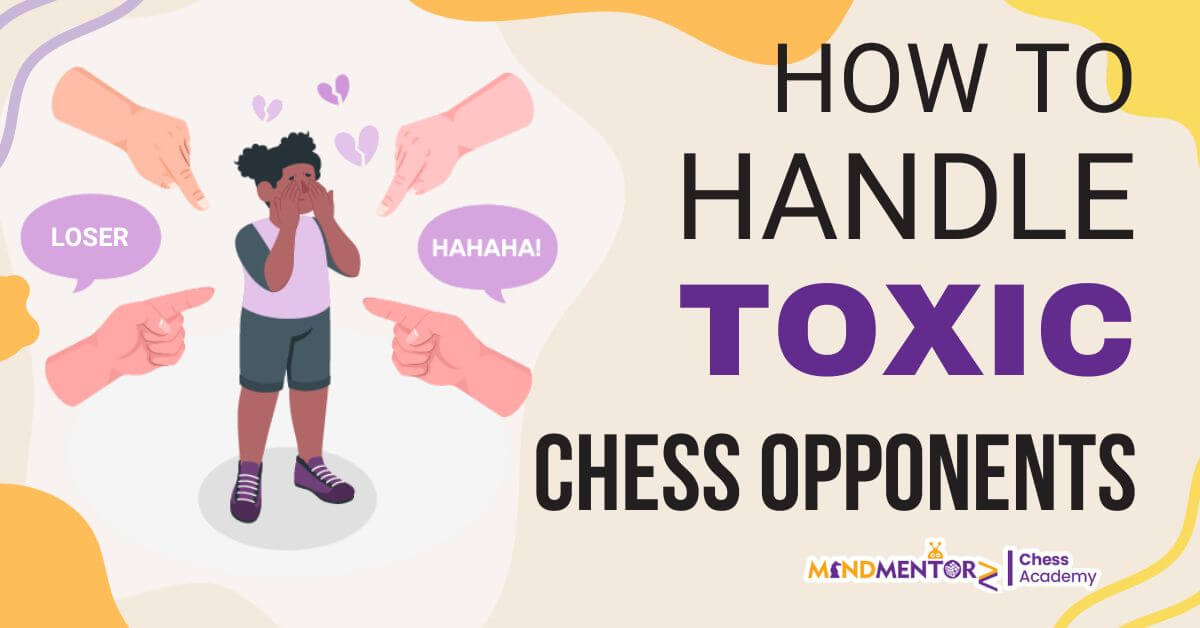
Chess, like any other competitive sport, should promote respect, discipline, and learning. Yet, we all encounter those players who, unfortunately, make the game unpleasant. Whether it’s snide remarks, trying to distract you, or behaving in an unsportsmanlike manner, dealing with toxic opponents can be mentally challenging. At MindMentorz Chess Academy, we believe in fostering not only chess skills but also mental resilience. Here’s how we recommend tackling such situations.
Stay Focused on Your Game
First and foremost, remember that the toxic behavior of your opponent is a distraction tactic. The moment they see you reacting, they get exactly what they want—your focus shifts from the game to them. Instead of letting their negativity affect your performance, try to block out their behavior. In online games, it’s even easier—you can mute their chat. But even in over-the-board (OTB) games, you can train yourself to focus entirely on the chessboard.
Realize It’s Not About You
It’s essential to understand that such behavior is more about your opponent’s personality than anything you did. Sometimes people act out because they feel insecure or frustrated. A toxic chess opponent often wants to provoke a reaction from you, and this shows a lack of confidence on their part. Don’t let their actions pull you into the mud. Instead, respond by keeping your cool and playing your best moves.
At MindMentorz, we teach our students to approach every game with a mindset of self-improvement. Whether you win or lose, the experience on the board is about your growth. Remembering this can keep you grounded, regardless of who you’re up against.
Take Action When Necessary
If things go too far, such as personal insults or harassment, don’t hesitate to take action. In an OTB tournament, calmly call the arbiter and explain the situation. In online chess platforms, there are options to block or report players. While it’s important not to get rattled, it’s equally important to stand up against inappropriate behavior when it crosses the line.
As an academy, we always encourage fair play, and if you’re participating in any events, it’s essential to be aware of your rights as a player. Reporting toxic behavior helps to make the environment better for everyone.
Compassion for the Opponent
This might sound odd, but one effective way to neutralize the negativity is to have a bit of empathy. Toxic players are often fighting battles we cannot see—maybe they’re having a bad day, or perhaps they haven’t learned how to manage their frustrations. By feeling compassion rather than anger, you rob their behavior of power. At MindMentorz, we focus on developing emotional intelligence in our students, helping them stay balanced not just in chess but in life.
Responding with Your Best Moves
One of the best ways to deal with a toxic opponent is to beat them on the board. After all, what could frustrate a toxic person more than losing the game they were trying to distract you from? Focus your energy on playing your A-game. Stay calm, calculate your moves, and avoid impulsive decisions that arise from anger or frustration. Many champions in the game have used this approach to deal with tricky situations, including some of the biggest names in Indian chess.
For example, chess legend Vishwanathan Anand has always been admired for his calm and composed demeanor, even in stressful situations. He’s a wonderful role model when it comes to focusing on the game, irrespective of what’s happening around.
Don’t Take It Personally
At the end of the day, a toxic player’s behavior is a reflection of their own issues. Once the game is over, let it go. Carrying that negativity into your next game or the rest of your day will only hurt you. We teach our students the art of letting go. Whether it’s a win or a loss, the goal is to keep learning, keep improving.
If you find yourself continuously encountering toxic opponents online, it might be useful to take a short break, reset your mindset, and come back fresh. At MindMentorz, we also recommend engaging in mindful activities or meditation for those struggling with emotional turbulence during intense games.
From our Lens: Strive to Rise Above situations
Dealing with toxic opponents is part of the chess journey, but it doesn’t have to affect your enjoyment or your growth as a player. At MindMentorz Chess Academy, we believe in fostering a positive and nurturing environment, both on and off the board. By maintaining focus, managing your emotions, and taking appropriate actions when necessary, you can not only handle toxic opponents but rise above them.
Every game is an opportunity to learn—whether your opponent is gracious or not. Stay true to the spirit of chess, and always aim for self-improvement.
